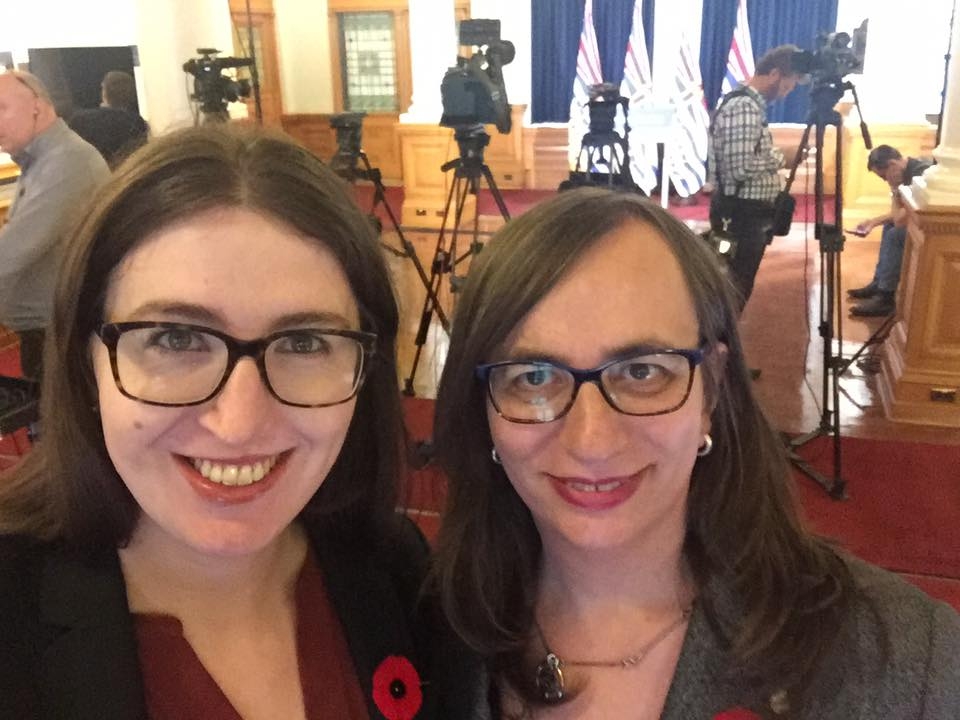British Columbia introduces non-binary gender markers on government ID.
A First-Nations youth poses at a pro-SOGI rally in Abbotsford.
First-nations communities have a broad understanding of the diversity of gender.
Photo: Morgane oger
British Columbians who do not identify as male or female will have the choice to display an X as a third option in the gender field of their B.C.-issued driver’s licence, identity card, birth certificate and BC Services Card. The announcement today follows yesterday’ introduction of law re-establishing the BC Human Rights Tribunal. The two steps reflect the BC Government’s encouraging work to better protect all British Columbians, the result of years of advocacy for better visibility and protection.
“The X gender designation is an important first step in building a more just province where people are recognized for who they are.”
- Mitzi Dean, Parliamentary Secretary for Gender Equity
The ministries of Health, Citizens’ Services and Attorney General have worked together to include an X designation option on government-issued identification documents. This option came into effect on Nov. 1, 2018.
Everyone has a gender identity and everyone has a sexual orientation. If you need to know it, ask.
Photo: Morgane Oger
”Adding self-declared, non-binary gender designation on BC ID where necessary is a welcome step towards recognizing that everybody has a gender, and that to know somebody’s gender you need to ask them.”
- Morgane Oger, transgender rights advocate
“We are taking action to move British Columbia into the 21st century when it comes to gender identity,” said Jinny Sims, Minister of Citizens’ Services. “This is a step in the right direction to ensure that identity documents better reflect identity. It is the right thing to do.”
“The lack of an alternative for those who do not identify with the male or female designation has previously resulted in cases that were being considered at the Human Rights Tribunal,” said David Eby, Attorney General. “This change is a step in the right direction to promote inclusivity for all people in British Columbia.” In 2015, eight complainants including Morgane Oger brought forward a complaint to the BC Human Rights Tribunal asking that sex designation be removed from birth certificates. The case is pending.
“Since last summer, we have been working on changes to government documents in recognition and respect of people who do not identify as male or female…Including the X gender designation on key ID is an important step in this.”
- Adrian Dix, Minister of Health.
The ministries are also exploring the next steps required to move to a non-medical model of gender identification to advance equity and inclusivity.
“As a trans individual, I know from personal experience that having identification documents that reflect who I am positively affects my access to education, employment, housing, health care and much more. I’m grateful that the Province is taking this action and confident that it will benefit many British Columbians and their families.”
- Gwen Haworth, Trans Care BC project manager
Dr. Marria Townsend, medical director, Trans Care BC –
“As a physician who works with trans and gender-diverse people, I have observed the multiple ways that non-binary people are invisiblized within our society, with negative impacts on their health and well-being. This is a positive step towards recognizing and affirming the humanity of those British Columbian's who don't identify as male or female.”
Morgane Oger Foundation Planning Lead Catherine Jenkins (left) and founder Morgane Oger (right) at the BC Legislature on November 1 during a press announcement introducing the BC Human Rights Commission
Photo: Catherine Jenkins
This latest development in British Columbia follows recent improvements in Canada towards acceptance that gender lies on a spectrum.
Wikipedia reports that In June 2016, the government of the province of Ontario announced changes to the way gender will be displayed on health cards and driver's licenses. Starting June 13, the Ontario health card no longer displays a sex designation. In early 2017, Ontario drivers will have the option to display "X" as a gender identifier on their driver's licenses.[40]
In April 2017, a baby born in British Columbia, Searyl Atli Doty, became the first in the world known to be issued a health card with a gender-neutral "U" sex marker. The parent, Kori Doty, who is non-binary transgender, wanted to give the child the opportunity to discover their own gender identity.[41][42] The province has refused to issue a birth certificate to the child without specifying a gender; Doty has filed a legal challenge. Doty and seven other transgender and intersex people including Morgane Oger have filed a human rights complaint against the province, alleging that publishing gender markers on birth certificates is discriminatory.[43]
In July 2017, the Northwest Territories began allowing "X" as a non-binary option on birth certificates.
On August 31, 2017, Canada began allowing an observation to be added to passports requesting that the holder's gender should be read as "X", indicating that it is unspecified, though a gender of "M" or "F" had to be added as a gender for an undefined period to comply with legal requirements of other countries.[45][46][47]
Read the BC Government press release:


